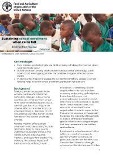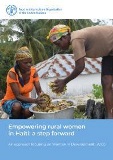Publications

Sustaining school enrolment when rains fail - Evidence from Malawi
23/09/2022
This policy brief is based on the paper on sustaining school enrolment when rains fail, a gender disaggregated analysis of the impacts of school feeding programmes on school enrolment in the context of dry shocks in Malawi. 4 pp.

Empowering rural women in Haiti: a step forward
22/09/2022
This document aims to highlight the Women in Development (WID) approach used by FAO in this project and thus highlight its best practices and lessons learned, as well as the benefits that women in particular and rural communities in general have been able to draw from it. 15 pp.

The Republic of Azerbaijan: Gender, agriculture and rural development (Country Gender Assessment Series)
20/09/2022
This Country Gender Assessment (CGA) for Azerbaijan is an important resource in shaping efforts to achieve the common goal of a more prosperous rural society with greater opportunities for all to realize their social and economic potential. It represents the first structured and all-encompassing collection of data and analysis, including development indicators for the agricultural and rural sectors of the country, with the application of a gender perspective. 110 pp.

Improving dietary diversity for women and children
07/09/2022
This handbook is developed to improve the dietary diversity of women (especially during pregnancy and breastfeeding) and children up to the age of two years. It contains practical guidance covering the aspects of production, collection, marketing, storage, processing, preparation, and consumption of diverse foods. Eating a variety of foods in appropriate quantities daily is a key to a healthy diet for everyone. 72 pp.

Support Government in Formulation of a National and Gender Sensitive Land Policy Guided by the VGGT Principles
05/09/2022
In light of the significant changes to land ownership in Zimbabwe, there is a compelling need for a comprehensive National Land Policy that integrates land administration and governance. This publication outlines the three outputs of the project and the considerable effort put into promoting gender equality in various spheres, includign land allocation. 11 pp.

Advancing Rural Women’s Economic Empowerment through Climate-resilient Agriculture: Experiences and Ways Forward from the Joint Programme on Rural Women’s Economic Empowerment
01/09/2022
This policy brief is part of a series to present evidence from the strategies and praxis and draws conclusions and makes recommendations for expanding sustainable development and climate change policies and programmes. 21 pp.

Gender mainstreaming in agriculture and food security: FAO Türkiye’s experiences 2021
23/08/2022
In response to the challenges outlined above, FAO Türkiye – as mandated by its national and international commitments on gender quality – cooperates with the Government of Türkiye to deliver a range of gender-mainstreamed and women-focused actions. This compilation of practices from the field aims to raise awareness among practitioners by sharing experiences and lessons learned in order to develop future actions. 48 pp.

Gender assessment in plantation forestry in Uganda
22/08/2022
Empowering women in forestry can create significant development opportunities and generate important additional benefits for their households and communities. Therefore, FAO conducted a study to assess status of gender equality and women empowerment in plantation forestry in Uganda and make recommendations on how to better integrate gender equality in commercial forestry. 60 pp.
